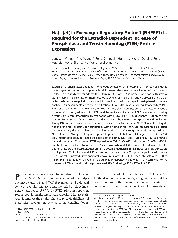摘要
Expression of phosphatase and tensin homologue deleted on chromosome 10 (PTEN) can be induced by estrogens at the posttranscriptional level. However, the molecular mechanism of the process is unclear. In this study, we found that the C terminus (CT) of PTEN is indispensable for 17-beta-estradiol (E2)-increased PTEN expression. Therefore, we screened for PTEN-CT-associated proteins using a glutathione-S-transferase pull-down approach in combination with mass spectrometry-based proteomic analyses. Our experiments led to the identification of Na(+)/H(+) exchanger regulatory factor 1 (NHERF1) as a major PTEN-CT binding partner. The first postsynaptic density protein-95/Discslarge/zonula occludens-1 homology domain of NHERF1 and the last four amino acids of PTEN were found to be key determinants of this interaction. By associating with PTEN, NHERF1 could enhance PTEN protein expression by retention of PTEN turnover, as demonstrated by NHERF1 overexpression and small interfering RNA-mediated knockdown experiments, respectively. Furthermore, NHERF1 inhibited ubiquitination of the PTEN protein upon competition with binding of PTEN to neural precursor cell expressed, developmentally down-regulated 4, an ubiquitin E3 ligase. E2 strongly induced the expression of NHERF1 and PTEN only in estrogen receptor (ER)-positive cells but not in ER-negative cells. ICI182780, an ER-specific inhibitor, decreased the expression of both NHERF1 and PTEN, and ICI182780 pretreatment also retarded E2-increased PTEN expression in ER-MDA-MB-231 cells. In both ER-MDA-MB-231 and MCF-7 cells, E2 failed to increase PTEN expression when NHERF1 was knocked down. Taken together, these are the first results that present a possible mechanism for E2-increased PTEN expression. In this process, E2 first induces NHERF1 expression by activating the ER. Upon competition with neural precursor cell expressed, developmentally down-regulated 4, NHERF1 then interacts with PTEN to inhibit PTEN degradation, through an ubiquitination-dependent pathway. This in turn leads to the increase of PTEN expression at the protein level. (Endocrinology 152: 4537-4549, 2011)
- 出版日期2011-12
- 单位首都医科大学; 北京市神经外科研究所
